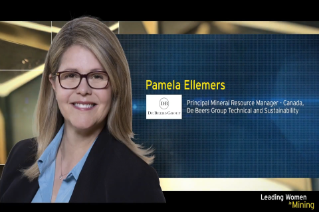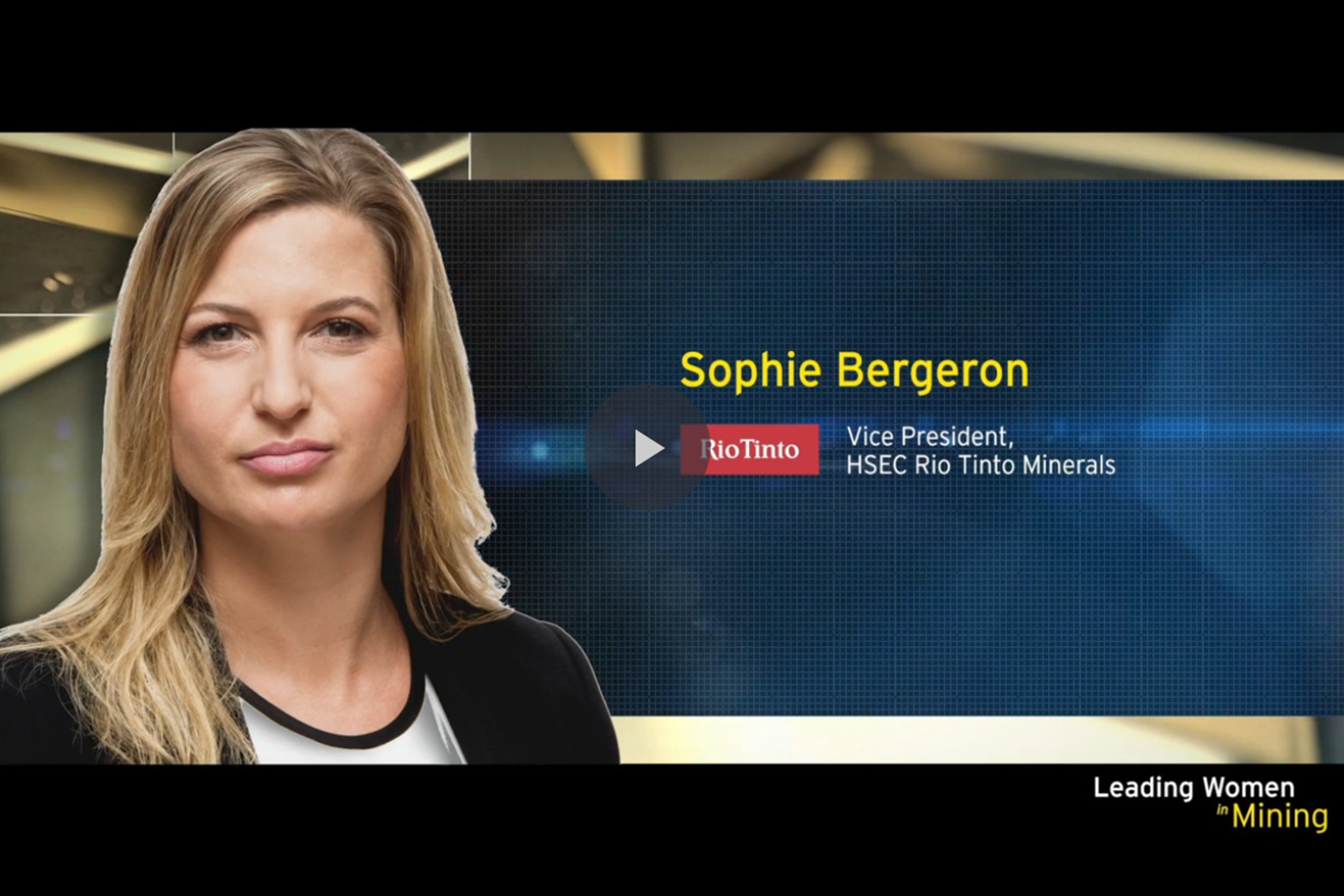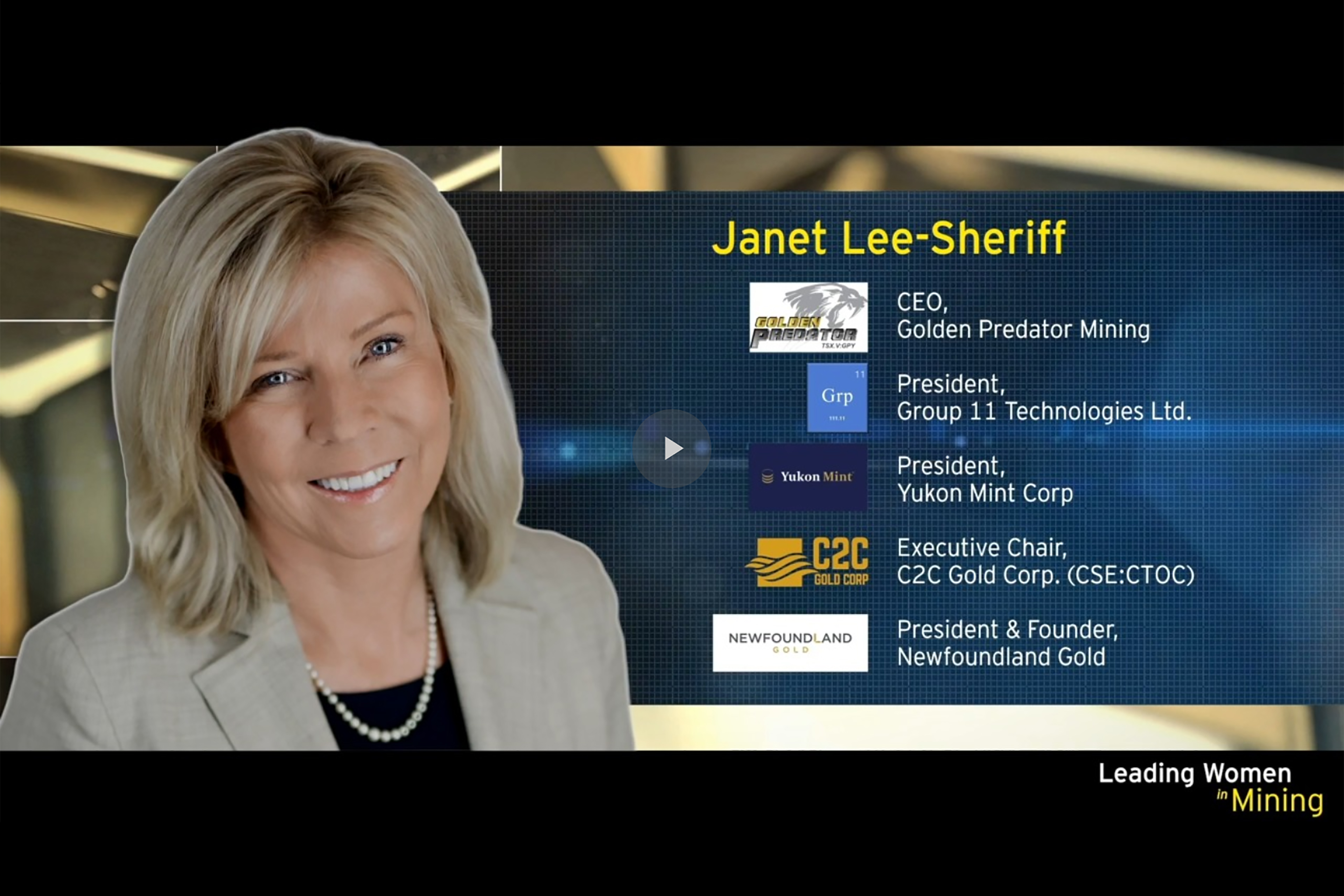EY refers to the global organization, and may refer to one or more, of the member firms of Ernst & Young Global Limited, each of which is a separate legal entity. Ernst & Young Global Limited, a UK company limited by guarantee, does not provide services to clients.

Watch Jennifer Maki, Member Board of Directors at Pan American Silver Corp., Baytex Energy Corp., and Franco-Nevada Corporation discuss the opportunities and lessons learned throughout her career.
Leading Women in Mining is a video series showcasing female role models in the sector who, by sharing their career journeys and lessons learned, are aiming to inspire and advance tomorrow’s women leaders in mining.
Jennifer Maki Member, Board of Directors at Pan American Silver Corp., Baytex Energy Corp., and Franco-Nevada Corporation.
Stephanie Porter: We’ve got Jennifer here with us today to talk about women in mining. And I’m so excited to be discussing this with you. Welcome.
Jennifer Maki: Thanks Stephanie. It’s my pleasure to be here. I’m really looking forward to talking today.
Stephanie Porter: Awesome. Well, I’d love to hear more about your career and specifically the key success factors that really helped you achieve your goals throughout.
Jennifer Maki: OK, well, I’ll start with a bit about my background. I have a Commerce degree from Queen’s and I’m a CA. I spent 10 years at one of the Big Four accounting firms, and at first, I worked in a variety of industries, and I eventually found my niche in the mining industry. And I had a big client, Inco Ltd., at the time, and I think what attracted me to mining was they were always doing really interesting, complex transactions, whether it be financing or M&A.
So that’s really where my passion for mining developed. And in 2003 I joined Inco. In 2006, Inco was acquired by Vale and at the time a lot of my colleagues left in the midst of the acquisition. I chose to stay and it was a great decision because I was provided with a lot of great career opportunities earlier in my career than typically would happen.
And from there I spent seven years as the CFO of Vale Base Metals and three years as the executive director of Vale Base Metals and CEO of Vale Canada, and at the end of 2017, I decided I needed a change and I started as a corporate director. And today I sit on the boards of Franco-Nevada, Pan-American Silver as well as Baytex Energy.
Stephanie Porter: Thanks for sharing your experience with us, Jennifer. That’s really interesting. I’d also love to hear about any lessons learned that you’ve gleaned throughout your experiences that you think really advanced your career path.
Jennifer Maki: First and foremost, I worked really hard. That’s for sure. And I know a lot of people work really hard, but one of the key things in my experience was I wasn’t afraid to try new roles or get involved in projects that kind of scared me. When we’re uncomfortable in a role or in a project, it shows that we’re really growing.
And sometimes I needed a push to do that role or to take on that new project. And I had some great mentors along the way and supporters that pushed me to take on challenging roles where I was really growing and developing. So I would encourage everybody if they’re in a role or they’re thinking about taking a role and you feel uncomfortable, it’s probably the right role for your own career growth.
Stephanie Porter: So true. That’s such great advice. And you mentioned role models and mentoring. Can you tell us a little bit about some role models that really helped you become the leader that you are today?
Jennifer Maki: The most impactful leaders or people that I worked for in my career was during the period when I was at Inco, and there were two men particularly. One was my boss and one was a senior executive. They did a really good job of sharing the lessons learned over their years of experience and sharing those with me so I wouldn’t make the same mistakes.
But also they did a really great job of making me feel supported and bringing me in on projects where there were opportunities for growth. So I owe a lot of the success I’ve had in my career to some great men that provided some great mentorship and leadership that I got to work under.
Stephanie Porter: Yeah, definitely. That sounds great. And I think those lessons learned are so applicable to today’s women. So if you could go back in time and talk to your 20-year-old self, what advice would you give?
Jennifer Maki: Yeah, there are three things I would tell my 20-year-old self, and the first one is to have more confidence in yourself and to believe in yourself, because there were often times where I had a lot of self-doubt creep in or I didn’t think I was capable of doing it.
And then, when you reflect and look back, you can surprise yourself. So check that lack of confidence at the door. I think also, I had to struggle with imposter syndrome and say, many times those conversations you have with yourself and talk yourself out of that.
And lastly, I think the value that can be provided by a career coach is great. And I wish I would have learned that maybe a little earlier on in my career. As my career went on, I had a great career coach that helped me, just go through life and go through challenges that I was having in roles and questioned me. And also somebody to talk to about, how I was feeling or what was bugging me or if I wanted to do something I didn’t know how about to go about doing it, having that kind of impartial voice to help you through those moments was very valuable.
Stephanie Porter: Yeah, absolutely. And I think it’s the most successful people that typically suffer from imposter syndrome. And unfortunately, it’s even more common in women than men. So you talked a lot about the challenges that you face and how you had a career coach that helped you through them. What do you think are some of the challenges that you see in the industry today that we need to look at to ensure that women succeed?
Jennifer Maki: The first and foremost is attracting women to the mining industry. It’s not a first thought for probably 90% of the females out there when they think about their career. And from that perspective, you need to start early in somebody’s life to get them interested in mining and whether you know it, be a primary school or high school, keeping females involved in STEM courses is key to having that interest. When you’re looking about a job, you’re looking about a career in the future. So reinforcing females’ role in STEM is key. The second challenge I think, the industry faces is that when you’re trying to attract young talent, whether it be male or female, today’s youth is a generation that wants to change the world. So, we need to show them that and connect how mining changes the world and how mining impacts the world in a positive manner. So that’s really key.
And the other challenge is probably unconscious bias that exists in the mining industry. And, you need to look, at hiring practices and things like that because females are probably judged on a harder criteria than males when you’re looking for roles.
So we have some work to do to change our hiring practices. I guess mid-career, later career or early career, so we’re bringing the females into the industry at the early stages.
Stephanie Porter: Absolutely. It’s really important for us to go through our biases and make sure that we’ve got good recruiting processes in place and we get women into the sector. So, you’ve worked at a bunch of different places. Once women come into the company, what are some of the things that you have seen be really successful in terms of helping women grow their career?
Jennifer Maki: Well, it starts at the very beginning of the career, and a lot of the organizations I’ve been involved with and that are in the mining industry are really focusing on recruiting more women into the company and really at all levels. And society is requiring that. Society is’ requiring the mining companies to have a more of a diverse workforce. And I think that’s great.
Once you’re in, what you see is mining companies trying to implement HR policies that are, suited or with the goal of retaining their women throughout their career, because you can often get women into the mining company. But then as the years go, they leave for a variety of reasons. So you see mining companies implementing policies in terms of flexible work environments, better-supported maternity leaves.
And you also see, {processes for} measuring who’s getting promoted, who’s getting retained, it’s an area that’s being closely monitored at the executive level and at the board level. And I believe what gets measured gets done so that executive and board focus in terms of diversity of the workforce and promoting women into more senior leadership can help overcome some of the challenges that we’ve had.
And lastly, there’s a role that automation has played. As we automate those jobs underground, there are more jobs on the surface. As more jobs become available on the surface and you have remote jobs, it is also easier to retain a higher proportion of your female workforce as they go through life and they’re balancing responsibilities outside of the workforce.
Stephanie Porter: Right. That makes sense. And so organizations step up and do the right thing, hiring more women, supporting them, mentoring them, retaining them and sponsoring them, we’ll have a lot of successful women in the industry. And at that point, how important do you think awareness is of showcasing the careers of women that are making a significant impact, and have you seen any kind of changes in the industry related to that?
Jennifer Maki: Well, it really comes down to the basic principles. If you can see it, you can believe it. So the visibility of women in senior roles and in also having a critical mass of women in junior roles, is really important. It’s important because if you don’t see it, you don’t believe it, you don’t think about it.
It was people’s grandfathers that worked in the mining industry, not people’s grandmothers. So hopefully as we’ve evolved over the last few years, that’s changing. And the more people see strong women role models in the mining industry, they’ll be attracted to that. And I do think it’s changing over time. When I was CFO and CEO, there were very few women in the C-suite in the mining industry.
And if you look today, the numbers have increased, there’s still more room to increase. But you know, it’s moving in the right trend. And I also think you see greater participation of females on boards of mining companies. And again, that’s part of a demand from society. But it’s great and it needs to continue. And you have to applaud companies like BHP that took a pledge a number of years ago to have 50% of their workforce female by mid 2020s, that would have been unheard of 10 years ago.
But when you see companies standing up and taking a leadership role in this area, you need to applaud them and support them. So that’s great.
Stephanie Porter: Yeah, that’s awesome. You’ve spoken a lot about wellbeing and work life balance and how the sector is changing. What do you think the industry is doing related to wellbeing and innovation, particularly for women?
Jennifer Maki: Well, the industry as a whole hasn’t been known over time as a very innovative industry. But that’s changing, and society is demanding that the industry change and that’s a great thing. And if you think about the new world, it’s fuelled with electrification, which you know, electrification needs to happen all throughout the mining process, but also with the metals that we produce through the mining process, those fuel, that new economy of electrification.
So from the very beginning to the end, as you look through that mining process, it’s being innovated and being rethought and transformed as we speak. And it’s not only in terms of, the trucks or the truckless mining that’s being used today. It’s also in terms of the process flows. When you look at the flow sheet in the process plants, those processes are being redesigned to reduce or eliminate greenhouse gas emissions from the process. So, I think we’re moving in the right direction, but it took us a long time as an industry to get there.
Stephanie Porter: Absolutely. And you’re the perfect person to answer this question because you yourself are a trailblazer who’s had a significant impact on the industry. But I’d like to know how you think other people, other women can become trailblazers and really make their mark on the industry.
Jennifer Maki: Well, it’s simple in the fact that if you do good work, good work gets noticed. And you might not feel like as you’re doing the work, you’re getting noticed, but you are inspiring the next generation of leaders as they see you take on new challenges, they see you succeed in a role and they see you change the process. They see you change the company over time, whether it be your area of the mine or whether it be your area in a support function in human resources being responsible for implementing a new policy, that at the end of the day retained more women in the workforce or they can look to their board. One of the boards I’m on, we have a female chair of the board at a mining company, which is something you don’t see very often. And so there’s lots to see to inspire the next generation of both male and female leaders.
Stephanie Porter: For sure. And I’ll send us off with an exciting question. What do you think the future of mining holds for up-and-coming women in the sector?
Jennifer Maki: Well, there’s never been a better time for women to be involved in the mining industry. As I mentioned earlier, society is demanding mining companies have a more diverse workforce and a more diverse leadership team. So the opportunities to grow and develop throughout your career and rise in the company are better than they’ve probably ever been in the past.
But I also think the work that the mining companies have to do in the next few years is a pool of really challenging, interesting work, whether it be automating the mining process, redesigning the flow sheet, marketing the new metals to this new green world we have. Whether it is operating, you know, as we go deeper or further.
And there are new challenges there to solve. Implementing new projects to meet the growing demand for those battery metals. I just feel like it’s full of opportunity and I hope that women seize these opportunities as we move forward because as I said, I don’t think there’s ever been a more positive time for mining and in females in mining.
Stephanie Porter: Great. Well, thanks so much for doing this, Jennifer. It really means a lot to us. It means a lot to me. It is great for women to hear your story who are already in the sector or who are thinking of coming in.
Jennifer Maki: Thank you for having me today.
Leading Women in Mining Interviews
Leading Women in Mining Episode 3 – Pamela Ellemers
Watch the interview with the inspirational Pamela Ellemers, principal Mineral Resource Manager – Canada, De Beers Group Technical and Sustainability.
Leading Women in Mining Episode 2 – Sophie Bergeron
Watch our first interview with Sophie Bergeron, Vice President, HSEC Rio Tinto Minerals, and hear her inspiring story as a leader in the mining industry.
Leading Women in Mining Episode 1 – Janet Lee-Sheriff
Watch our first interview with Janet Lee-Sheriff, Executive Chair, C2C Gold Corp. and hear her inspiring story in the mining industry.





